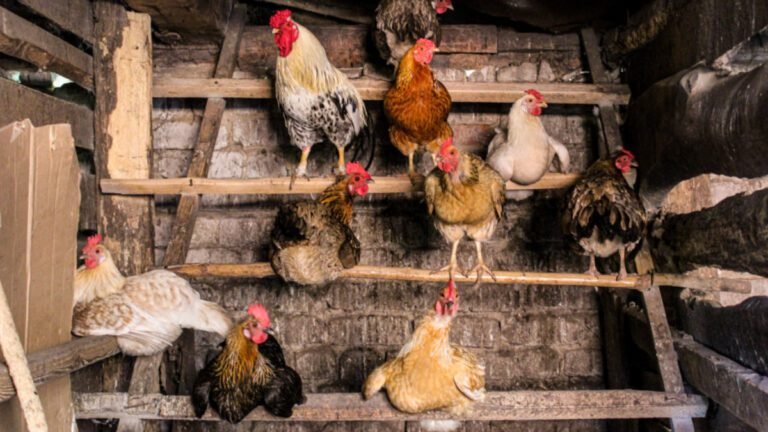Ever thought about raising chickens but don’t know where to start? If you’re a prepper, having a flock of chickens is a game-changer for self-sufficiency and sustainability. Chickens provide a steady supply of fresh eggs and can even help with pest control on your homestead. Not to mention, they’re relatively easy to care for, making them a practical addition to any prepper’s toolkit.
Raising chickens isn’t just about survival; it’s about thriving. With the right knowledge, your backyard chickens can flourish. They need specific housing, feed, and care, but once you get the hang of it, the rewards are plentiful.
By adopting a MECE (Mutually Exclusive, Collectively Exhaustive) framework, we’ll break down the essentials into clear, organized sections. This way, you’ll have all the information you need, without feeling overwhelmed. Ready to learn how raising chickens can significantly enhance your self-sufficiency?

Post Contents
ToggleGetting Started
Raising chickens can be an extremely rewarding experience. Whether you’re interested in a sustainable source of fresh eggs and meat, pest control, or just the simple joy of having animals around, chickens can be a fantastic addition to your homestead. Here’s everything you need to know to get started.
Why Raise Chickens?
There are several benefits to raising chickens:
- Fresh Eggs and Meat: One of the most immediate benefits is the daily supply of fresh eggs. Fresh eggs are richer in flavor and nutrients compared to store-bought ones. If you’re up for it, chickens can also provide a source of fresh meat.
- Cost Savings: Over time, raising chickens can save you money. Instead of buying eggs and meat, you have a steady supply right in your backyard.
- Pest Control: Chickens are natural pest control agents. They love to eat bugs, reducing the need for pesticides. This makes your garden healthier and free from harsh chemicals.
In summary, chickens not only contribute to your food supply but also help in maintaining a balanced ecosystem in your backyard.
Selecting the Right Breed
Choosing the right breed is critical for your success, especially as a beginner.
Consider these factors when selecting breeds:
- Climate: Some breeds are more heat-tolerant while others do better in cold climates.
- Purpose: Are you raising chickens for eggs, meat, or both? Different breeds excel in different areas.
- Temperament: Some breeds are friendlier and more docile, making them easier to handle.
Popular breeds for beginners include:
- Rhode Island Red: Known for their hardiness and reliable egg production. They are friendly and easy to manage.
- Plymouth Rock: These chickens are great for both meat and eggs. They are also known for their calm temperament.
- Leghorns: Best known for their high egg production, Leghorns are active and hardy birds.
Selecting the right breed tailored to your needs will set you on the path to a successful chicken-raising experience.
Setting Up Your Chicken Coop
Your chicken coop is the heart of your operation, and setting it up requires careful planning.
Here are key considerations and tips:
- Location: Choose a dry, well-ventilated area. Ensure it’s safe from predators and has enough space for your flock to roam.
- Size and Design: The coop size depends on the number of chickens. As a rule of thumb, provide at least 2-3 square feet per chicken inside the coop and 8-10 square feet per chicken in the outdoor run.
- Essential Features:
- Roosting Bars: Chickens need a place to perch at night.
- Nesting Boxes: Provide one nesting box for every 3-4 hens for egg-laying.
- Ventilation: Proper airflow is crucial to avoid respiratory issues.
- Security: Ensure the coop is predator-proof with sturdy materials and secure locks.
For more detailed coop plans and tips, check out this guide to building a chicken coop, which offers step-by-step instructions and ideas.
By paying attention to these details, you’ll create a safe and comfortable environment for your chickens, ensuring they thrive and produce for your homestead.

Day-to-Day Care
Taking care of your chickens on a daily basis can seem like a lot of work, but it quickly becomes a routine. Here’s how you can give your feathered friends the best care possible every day.
Feeding Your Chickens
Chickens have specific nutritional needs to stay healthy and productive. Their diet should include a balanced mix of proteins, grains, and greens.
Nutritional Requirements:
- Proteins: Essential for growth and egg production. Typically, chicken feed has 16-20% protein.
- Grains: Important for energy. Common grains include corn and wheat.
- Greens: Provide vitamins and minerals. Chickens enjoy foraging for grass and weeds.
You have two main options when it comes to feeding your flock: homemade feed or commercial feed.
Homemade Feed vs. Commercial Feed:
- Homemade Feed: Allows you to control ingredients, which is great if you’re into organic or non-GMO options. However, it can be time-consuming to prepare.
- Commercial Feed: Convenient and formulated to meet chickens’ nutritional requirements. Look for reputable brands and types specific to the age and purpose of your chickens, such as layers or broilers.
Include supplements in their diet like:
- Oyster Shells: Provide calcium for strong eggshells.
- Grit: Helps chickens digest food properly, especially when they eat grains and greens.
Healthy hens lay consistently and have vibrant feathers. Here’s a link to more detailed information on chicken feeding basics.
Health and Wellness
Maintaining the health of your chickens is critical. Knowing common diseases and being proactive in prevention can save you a lot of trouble.
Common Diseases and Prevention:
- Marek’s Disease: A viral disease preventable by vaccination.
- Coccidiosis: A parasitic disease. Keep the coop clean and use medicated feed for chicks.
- Avian Influenza: Maintain good biosecurity to prevent these viruses.
Vaccination Schedule:
- Day 1: Marek’s Disease.
- 2 Weeks: Newcastle and Infectious Bronchitis.
- 4 Weeks: Fowl Pox.
Signs of a Healthy Chicken:
- Bright eyes and red combs.
- Shiny and smooth feathers.
- Regular eating and active behavior.
Early detection of problems is key. If you notice any changes in behaviour or appearance, consult a vet. For more details on chicken diseases and prevention, check out the American Poultry Association.


Cleaning and Maintenance
A clean environment is vital for happy and healthy chickens. Keeping the coop clean prevents diseases and pests.
Daily Tasks:
- Check Food and Water: Ensure they always have fresh food and water.
- Remove Droppings: Use a scoop to clean the coop floor and perches.
Weekly Chores:
- Clean Feeders and Waterers: Use warm, soapy water to prevent bacterial growth.
- Change Bedding: Replace old bedding with fresh straw or pine shavings.
Seasonal Deep Cleaning:
- Remove All Bedding: Clean every surface with a mild disinfectant.
- Check for Pests: Look for mites and lice, treating if necessary.
- Ventilation: Ensure good airflow to prevent respiratory problems, which is particularly crucial in cold months.
Consistency is key in maintaining a healthy chicken environment. Here’s more about keeping your chicken coop clean and healthy from Backyard Chickens.
Taking these steps will ensure your chickens are well-fed, healthy, and living in a clean environment, setting the stage for a thriving flock.
Advanced Tips
Raising chickens can be a rewarding venture, especially when you’re looking to maximize productivity and ensure the health of your flock. Here are some advanced tips to help you navigate the intricacies of chicken care like a pro.
Breeding Chickens
Breeding chickens requires careful planning and attention. Whether you’re aiming for strong genetics or simply expanding your flock, understanding the basics of breeding is crucial.
- Selecting Breeders: Choose healthy, mature birds with desirable traits. Pay attention to physical health, behavior, and production history.
- Incubation Tips:
- Use a reliable incubator to ensure a stable temperature and humidity.
- Turn the eggs several times a day to prevent the embryo from sticking to the shell.
- Maintain a temperature around 99.5°F (37.5°C) and humidity levels between 40-50% for the first 18 days, increasing humidity to 65-75% for the final days before hatching.
- Raising Chicks:
- Provide a brooder with a heat source, such as a heat lamp, ensuring the temperature starts at 95°F (35°C) and decreases by 5°F each week.
- Offer a high-protein starter feed and clean water.
- Keep the brooder clean and dry to prevent diseases.
By following these guidelines, you can successfully breed and raise strong, healthy chicks.
For more detailed guides on chicken breeding and incubation, check out these helpful resources.

Dealing with Predators
Predators are an inevitable challenge when raising chickens. Knowing the common predators and how to protect your flock is essential.
- Identifying Common Predators:
- Raccoons: Known for their dexterity, they can open latches and climb.
- Foxes: Stealthy and often hunt at dawn and dusk.
- Hawks and Owls: Aerial predators that can swoop down and carry off chickens.
- Preventive Measures:
- Secure the Coop: Use sturdy locks and hardware cloth instead of chicken wire, which predators can tear through.
- Enclose Run Areas: Install overhead netting or secure roofs to protect from aerial threats.
- Install Motion Lights: Bright lights can deter nocturnal predators.
- Actions During an Attack
- Stay Calm: Quickly assess the situation without panicking.
- Protect Surviving Birds: Safely gather and confine the flock.
- Reinforce Security: Identify the entry points and reinforce them to prevent future attacks.
By taking these measures, you’ll significantly reduce predator attacks and keep your flock safe.
For more detailed tips, here’s a resource on dealing with common chicken predators.
Winter and Summer Care
Chickens need different care depending on the season. Keeping them comfortable in extreme weather conditions is key to their health and productivity.
Winter Care
- Insulate the Coop: Use straw bales or insulation boards to keep the coop warm.
- Provide Heat: Use heat lamps sparingly to avoid fire hazards. Ensure good ventilation to prevent moisture build-up, which can lead to frostbite.
- Feed Adjustments: Increase the protein content in their feed to help them maintain their body heat. Offer warm, nutritious treats like oatmeal.
Summer Care
- Shade and Ventilation: Ensure the coop has adequate shade and ventilation to keep the chickens cool.
- Hydration: Provide plenty of fresh, cool water. Consider adding electrolytes to prevent dehydration.
- Adjust Feed: Offer lighter, more frequent meals to prevent spoilage in the heat. Include fruits and vegetables with high water content.
By making these seasonal adjustments, you’ll ensure your chickens stay healthy and productive all year round.
For more tips on seasonal chicken care, check out this comprehensive guide.
Learning and implementing these advanced tips will not only improve your flock’s health but also increase your satisfaction and success in raising chickens.


Maximizing Benefits
If you’re going to raise chickens, make sure to get the most out of the experience. From eggs and meat to even manure, these birds provide many benefits.
Utilizing Eggs
Egg production is one of the main perks of raising chickens.
- Production Stats: Did you know that a healthy hen can lay up to 250-300 eggs per year? That’s a lot of breakfasts!
- Storage and Preservation:
- Room Temperature: Unwashed eggs can be kept at room temperature for up to two weeks.
- Refrigeration: For longer storage, keep them in the fridge. They can stay fresh for up to three months.
- Preservation Methods: Water glassing is a method where you store eggs in a water-glass solution to keep them fresh for up to a year.
Recipe Ideas:
- Breakfast Ideas: Scrambled eggs, omelets, or sunny-side-ups.
- Baking: Cakes, cookies, and bread get a richer flavour with fresh eggs.
- Snacks: Deviled eggs or egg salad sandwiches.
Raising chickens for eggs means you always have fresh ingredients on hand for various meals. For more on the benefits, check out this detailed guide.
Using Chicken Manure
Chicken manure is like gold for gardeners.
- Benefits for Gardening: Chicken manure is high in nitrogen, phosphorus, and potassium, which are essential nutrients for plants.
- Composting Tips:
- Balance: Combine chicken manure with carbon-rich materials like leaves or straw.
- Turn the Pile: Regularly turning the compost speeds up the decomposition process.
- Curing: Let the compost cure for at least six months to eliminate pathogens.
- Direct Application: Apply aged manure directly to garden soil to improve fertility and water retention.
For more on making the most of chicken manure, this article offers valuable insights.
Harvesting Meat
Harvesting meat from your chickens can be done ethically and safely.
- Ethical Methods: Ensure the birds are calm and handled gently. Many people use a cone setup where the chickens are placed upside down, which is quick and humane.
- Processing Tips: After dispatching, scald the birds in hot water to loosen feathers for plucking. Eviscerate carefully to avoid contaminating the meat.
- Storage Solutions:
- Refrigeration: Fresh meat can be kept in the fridge for up to two days.
- Freezing: For longer storage, freeze the meat. It can last for up to a year when properly vacuum sealed.
For detailed steps on ethical processing and storage methods, check out these ethical harvesting tips.
By focusing on these areas, you can maximize the benefits of raising chickens, making your homestead more efficient and sustainable.
Frequently Asked Questions About Raising Chickens
Raising chickens comes with lots of questions, especially if you’re new to it. Here, I’ll answer some of the most common queries people have when starting out.
How many chickens should I start with?
Starting small is key. I recommend beginning with 3-5 hens. This number is manageable but still enough to provide you with plenty of fresh eggs. Chickens are social animals, so having a few ensures they stay happy and healthy.
How much space do chickens need?
Chickens need both indoor and outdoor space. Inside the coop, each chicken should have at least 2-3 square feet. In the run, aim for 8-10 square feet per bird. This gives them enough room to move, scratch, and forage without feeling cramped.
What do I do if my chickens stop laying eggs?
When chickens stop laying, it could be due to several reasons. Here’s what to check:
- Daylight: Chickens need about 14 hours of light per day to lay eggs. Consider adding artificial light in the coop during shorter days.
- Diet: Ensure they have a balanced diet with enough protein and calcium.
- Age: Chickens lay most eggs in their first 2 years. After this, laying decreases.
- Stress: Predators, changes in environment, or even new flock members can stress chickens and reduce egg production.
How can I protect my chickens from predators?
Predators are a common worry for chicken owners. Here are steps to protect your flock:
- Secure the Coop: Use hardware cloth instead of chicken wire. Predators can’t chew through it.
- Lock Doors: Use latches that raccoons and other clever animals can’t figure out.
- Install Lights: Motion-activated lights can scare off nocturnal predators.
- Build a Fence: Make it tall enough and bury it a couple of feet underground to stop digging predators.
What are signs that my chicken is sick?
It’s important to recognize when a chicken isn’t feeling well. Look for:
- Lethargy: A normally active bird that becomes lazy may be sick.
- Feather Loss: While molting is normal, excessive feather loss is a sign of poor health.
- Discolored Comb: A pale or shriveled comb can indicate illness.
- Unusual Droppings: Consistency and color changes can signal digestive problems.
For more detailed symptoms and treatment options, refer to this guide on chicken health.
Can chickens and other pets coexist?
Chickens can live with other pets, like dogs and cats, but it requires a careful introduction. Keep an eye on how other pets react. Some dogs have a strong prey drive and might see chickens as toys. Always supervise their interactions initially to ensure everyone’s safety.
What kind of bedding material is best?
Choosing the right bedding is crucial for a clean and healthy coop. Options include:
- Pine Shavings: Absorbent and controls odor well.
- Straw: Good for insulation but needs frequent changing.
- Sand: Easy to clean but may require good drainage.
I personally prefer pine shavings due to their balance of absorbency and ease of cleaning.
How often should I clean the chicken coop?
Regular cleaning is critical. Follow this schedule:
- Daily: Remove droppings and check food and water.
- Weekly: Change bedding and clean feeders and waterers.
- Monthly: Deep clean the entire coop, including walls and nests.
Do I need a rooster for my hens to lay eggs?
No, you don’t need a rooster for hens to lay eggs. Hens will lay eggs regardless of whether a rooster is present. However, a rooster is necessary if you want the eggs to be fertilized and hatch into chicks.
Can I raise chickens in a small backyard?
Absolutely! Chickens can thrive even in smaller spaces, like urban backyards. Just ensure they have enough space, protection from predators, and daily care. Many cities allow backyard chickens, so check your local regulations. If space is really tight, consider bantam breeds, which are smaller and require less room.
For more on urban chicken keeping, check out Backyard Poultry’s guide.
Conclusion
Raising chickens is a practical and rewarding step toward self-sufficiency and sustainability. By providing fresh eggs, natural pest control, and even organic fertilizer, chickens make a valuable addition to any prepper’s homestead.
With the knowledge and tips shared here, getting started is straightforward. Begin with a small flock, invest in a secure coop, and ensure proper care and nutrition. Consistency and vigilance will keep your chickens healthy and productive.
Now is the time to take action. Embrace the journey and enjoy the numerous benefits that come with raising chickens. Your path to a more sustainable and prepared life starts today.














